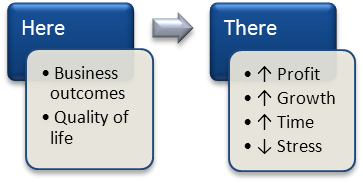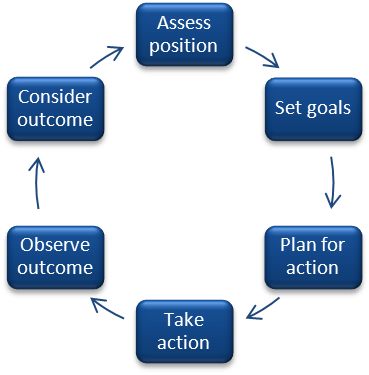Achieving the success you want requires as much science as art. And it has little to do with luck.
This science involves identifying the thoughts and habits that are holding you back and adopting a widely used and proven process that will take you forward - a process that can transform your practice, your career and your personal life for the better.
A bold claim, but consider the evidence.
Every day we face hundreds of decisions about what we will and won't do. Many of these decisions are like the default options on a computer. We don't consciously decide. We just continue on automatic pilot, doing what we have always done.
Even when we don't like the results, we continue to repeat the same behaviour year after year with the hope that things will get better - continuing to flog a dead horse with the hope it will get up and win the race.
Even some of our conscious decisions are little more than habitual responses based on old beliefs that may no longer hold true. For instance, as a student you learned that success came from intelligence and hard work. You may still believe that hard work is the sole key to success in business. But does working harder truly lead to greater success, or could this belief actually be holding you back?
Consider the evidence:
Clearly, hard work is necessary, but it is not sufficient.
In addition to hard work, we need a plan to take us from where we are to where we want to be.
For example, in your personal life, you may want to get more exercise, lose weight, spend more time with your family, or take an overseas holiday. But the reality is many of the things you want most will never happen, unless you consciously make them happen. Without a plan, they are little more than a wish list.
The same applies in business.
We rarely get the outcome we want unless we make it happen.
All we need is to figure out what to do and do it. Not so simple, you might say. But there is a simple, incremental process that can help.
The process is no secret. It is well published and widely used in science. It is used by athletes, taught by business schools and used by large corporations.
You may know the process as the scientific method or strategic planning or by some other name. And you may believe that it has nothing to offer you. But think again.
In some ways, it is easier for an individual to use this process than for a large organisation - even an individual who is time poor and has too few resources. By adapting and scaling the process, you can make it manageable, so it doesn't get pushed to one side by the constant demands of business.
Consider the upside. What if you could use this process to deliver greater success - more money, more time, more freedom, more recognition, an earlier retirement ...?
For the moment, forget what makes your eyes glaze over at the mere mention of mission statements, SWOT analyses, brain storming and strategic planning. Keep it simple.
In essence, you want to go from Here to There and you are dissatisfied with your progress.

You have two choices:
Continuing to do what you have done before will most likely lead to the same old frustrating result.
Doing something different will almost certainly lead to a different result - hopefully better, but maybe worse. This uncertainty about the possible outcome may be holding you back from trying anything different, but consider the potential long term results.
Most importantly, the process allows you to learn what works and what doesn't. Progressively, you can fine tune what you do and the direction you go according to the results you get.

The logic is clear.
By making a series of small changes in your own behaviour, it is almost certain that these changes will bring you closer to where you want to be.
While this process is suitable for everyone, a text-book approach will not work for everyone. We each need to adapt the process to match our individual circumstances such that the process becomes part of our everyday activity, without being burdensome.
Even so, the reality is that many people are unable to make a start.
You may be too busy working hard to ever get around to planning how to work smarter. Unless you set aside some time, there will always be something more urgent than planning.
And if you make the planning process too involved, you are likely to get overwhelmed and give up.
A few tips:
To take your first step, just make an appointment with yourself to start and make a second appointment to check your progress. By making these appointments, you reinforce your decision to change your life for the better and start the process to achieve the success you want.